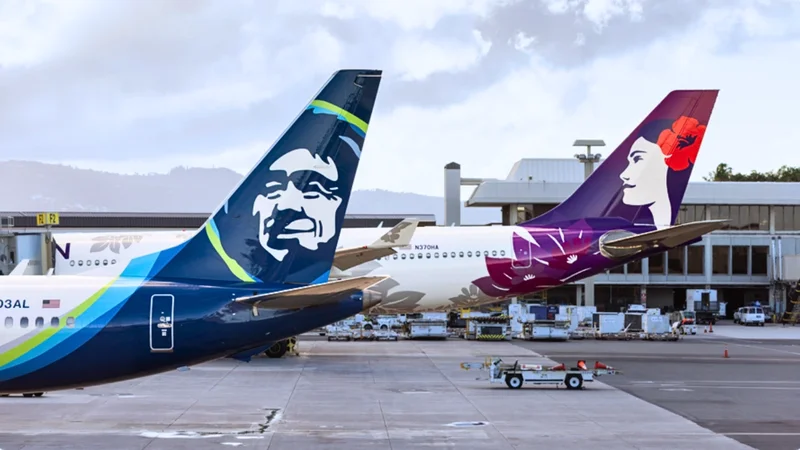Real-Time BNB Signal Analytics
Real-Time BNB Signal Analytics
So, Alaska Airlines just… stopped.
One minute it’s a functioning airline, shuttling people from Seattle to San Diego. The next, its entire fleet of Boeing and Airbus jets are expensive, 100-ton lawn ornaments. BREAKING: Alaska Airlines grounds all flights - king5.com. The official reason? An “IT outage.”
Let’s just pause and savor the magnificent emptiness of that phrase. An “IT outage.” It’s the corporate equivalent of a magician waving a silk handkerchief to distract you while his assistant scrambles to find the rabbit that just escaped its cage. It’s a meaningless, two-word shrug designed to say everything and nothing at all.
It’s just a travel headache. No, a ‘headache’ doesn’t cover it—this is a full-blown aneurysm in the circulatory system of modern life. Right now, as I’m typing this, thousands of people are sitting on those miserably-padded airport chairs, staring at a departure board full of red “CANCELED” notices. I can almost hear the tinny, looping airport announcement music mingling with the furious tapping of thumbs on phones, all because a server somewhere decided to take an unscheduled nap.
And the silence from Alaska Airlines is deafening. We got the initial alert at 5:01 PM PDT, and since then? Crickets. This isn’t some minor glitch with the in-flight entertainment system. This is the digital brain of an entire airline flatlining. And they have nothing to say?
“IT outage” is now my least favorite phrase in the English language, and that’s saying something in a world that still contains “synergistic growth-hacking” and “artisanal mayonnaise.” It’s a black box. A void. It’s a doctor telling you that you have a “body problem.” It’s technically true, but it’s also completely, terrifyingly useless.
What does it even mean? Did a disgruntled employee trip over a power cord in the main server room? Did a software update, pushed by some underpaid coder in a cubicle farm, contain a bug so catastrophic it brought the whole damn thing down? Or is it something darker? Was it a ransomware attack? A foreign actor testing our infrastructure’s brittleness?

The company’s silence suggests they either don’t know, which is terrifying, or they do know and the truth is so bad they can’t possibly tell us, which is even more terrifying. We, the paying customers, are just supposed to accept this vague explanation and rebook our flights for next Tuesday. Give me a break.
This is the fundamental bargain we’ve made in the 21st century. We’ve traded tangible, mechanical reliability for the sleek, invisible convenience of software. We’ve built a world that runs on code we don’t understand, hosted on servers we can’t see, maintained by people we’ll never meet. And when it breaks, we’re left standing in a terminal in Boise with a useless boarding pass and a vague explanation about an “IT outage.” It ain’t right.
Look, this isn’t just about a few canceled flights or some ruined vacation plans. This is a symptom of a much deeper sickness. We have built our entire civilization—from air travel and banking to power grids and communication—on a foundation of pure, unadulterated code. It’s a Jenga tower of ones and zeroes, and someone just pulled out a critical block from the bottom.
Every single piece of our lives is interconnected now. My damn refrigerator wants to connect to the Wi-Fi, for God’s sake. Just last week it decided it needed a firmware update and shut down the ice maker until I agreed. That’s an inconvenience. This, with Alaska Airlines, is a preview of the main event. This is what happens when the systems we’ve become hopelessly dependent on simply… stop.
You can almost picture the scene: a single dark server room, the only light coming from a rack of blinking red error lights. A handful of engineers are chugging stale coffee, frantically typing commands into a terminal, trying to figure out which one of the millions of lines of code has betrayed them. Their keystrokes are the only sound, a desperate Morse code against the suffocating silence of a system that has gone completely, utterly dead.
Are we really supposed to believe that a multi-billion dollar corporation doesn't have redundancies for their core systems? That there isn't some analog, break-glass-in-case-of-emergency protocol to keep planes moving? Offcourse they’ll issue a press release full of corporate jargon about 'robustness' and 'resiliency' and we're all supposed to just nod along. But the proof is right there, sitting on the tarmac.
Then again, maybe I'm the crazy one. Maybe we should all just be happy our flying metal tubes are controlled by software at all. But when that software fails, it doesn’t just fail a little. It fails completely. And right now, an entire airline is learning that lesson the hard way.
Don’t let anyone tell you this is a one-off incident. This is a fire drill. This is the tremor before the earthquake. For years, we’ve been warned by security experts and grizzled old-school engineers that our rush to digitize everything has made us fragile. We’ve ignored them, chasing efficiency and profit. Today, it’s Alaska Airlines. Tomorrow, what is it? The power grid? The stock market? The banking system? The systems are all the same—complex, opaque, and terrifyingly brittle. We’re watching a dress rehearsal for a much bigger show, and we don’t even have tickets. We’re the stagehands, and the whole set is about to collapse on top of us.